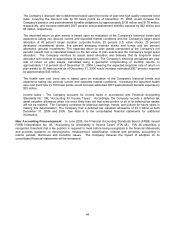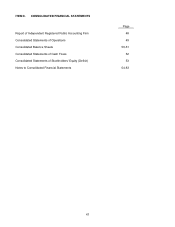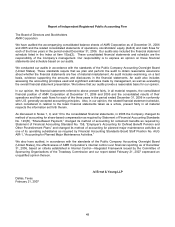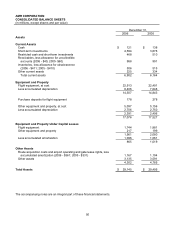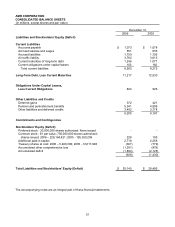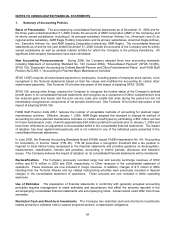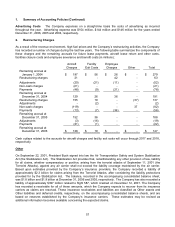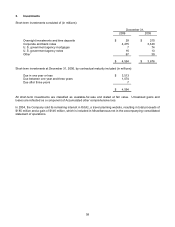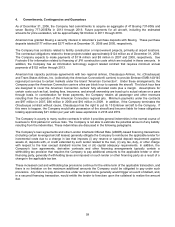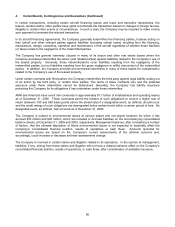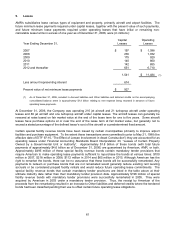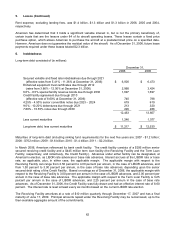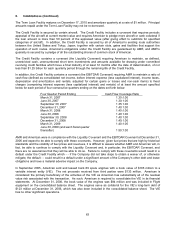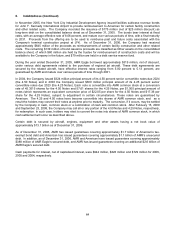American Airlines 2006 Annual Report Download - page 58
Download and view the complete annual report
Please find page 58 of the 2006 American Airlines annual report below. You can navigate through the pages in the report by either clicking on the pages listed below, or by using the keyword search tool below to find specific information within the annual report.
54
NOTES TO CONSOLIDATED FINANCIAL STATEMENTS
1. Summary of Accounting Policies
Basis of Presentation The accompanying consolidated financial statements as of December 31, 2006 and for
the three years ended December 31, 2006 include the accounts of AMR Corporation (AMR or the Company) and
its wholly owned subsidiaries, including (i) its principal subsidiary American Airlines, Inc. (American) and (ii) its
regional airline subsidiary, AMR Eagle Holding Corporation and its primary subsidiaries, American Eagle Airlines,
Inc., Executive Airlines, Inc. and AMR Leasing Corporation (collectively, AMR Eagle). The consolidated financial
statements as of and for the year ended December 31, 2006 include the accounts of the Company and its wholly
owned subsidiaries as well as variable interest entities for which the Company is the primary beneficiary. All
significant intercompany transactions have been eliminated.
New Accounting Pronouncements During 2006, the Company adopted three new accounting standards
including Statement of Accounting Standard No. 123 (revised 2004), “Share-Based Payment” (SFAS 123(R)),
SFAS 158, “Employers’ Accounting for Defined Benefit Pension and Other Postretirement Plans”, and FASB Staff
Position AUG AIR-1, “Accounting for Planned Major Maintenance Activities”.
SFAS 123(R) requires all share-based payments to employees, including grants of employee stock options, to be
recognized in the financial statements based on their fair values and modified the accounting for certain other
share-based payments. See Footnote 9 for further discussion of the impact of adopting SFAS 123(R).
SFAS 158, among other things, requires the Company to recognize the funded status of the Company’s defined
benefit plans in its consolidated financial statements and recognize as a component of Other comprehensive loss
the actuarial gains and losses and the prior service costs and credits that arise during the period but are not
immediately recognized as components of net periodic benefit cost. See Footnote 10 for further discussion of the
impact of adopting SFAS 158.
FASB Staff Position AUG AIR-1 reduces the number of acceptable methods of accounting for planned major
maintenance activities. Effective January 1, 2006, AMR Eagle adopted this standard to change its method of
accounting for some planned maintenance activities on certain aircraft types by eliminating a $52 million accrual
for future maintenance costs, of which approximately $38 million pertained to periods prior to January 1, 2004 and
have been reflected as an adjustment to Accumulated deficit in the consolidated financial statements. The impact
of adoption has been applied retrospectively and is not material to any of the individual years presented in the
consolidated financial statements.
In June 2006, the Financial Accounting Standards Board (FASB) issued FASB Interpretation No. 48, “Accounting
for Uncertainty in Income Taxes” (FIN 48). FIN 48 prescribes a recognition threshold that a tax position is
required to meet before being recognized in the financial statements and provides guidance on derecognition,
measurement, classification, interest and penalties, accounting in interim periods, disclosure and transition
issues. The Company believes the impact of adoption on its consolidated financial statements will be immaterial.
Reclassifications The Company previously recorded cargo fuel and security surcharge revenues of $162
million and $113 million in 2005 and 2004, respectively, in Other revenues in the consolidated statement of
operations. These revenues are now included in Cargo revenues. In addition, charges of $11 million in 2004
resulting from the Terrorist Attacks and our related restructuring activities were previously recorded in Special
charges in the consolidated statement of operations. These amounts are now included in Other operating
expenses.
Use of Estimates The preparation of financial statements in conformity with generally accepted accounting
principles requires management to make estimates and assumptions that affect the amounts reported in the
accompanying consolidated financial statements and accompanying notes. Actual results could differ from those
estimates.
Restricted Cash and Short-term Investments The Company has restricted cash and short-term investments
related primarily to collateral held to support projected workers’ compensation obligations.


